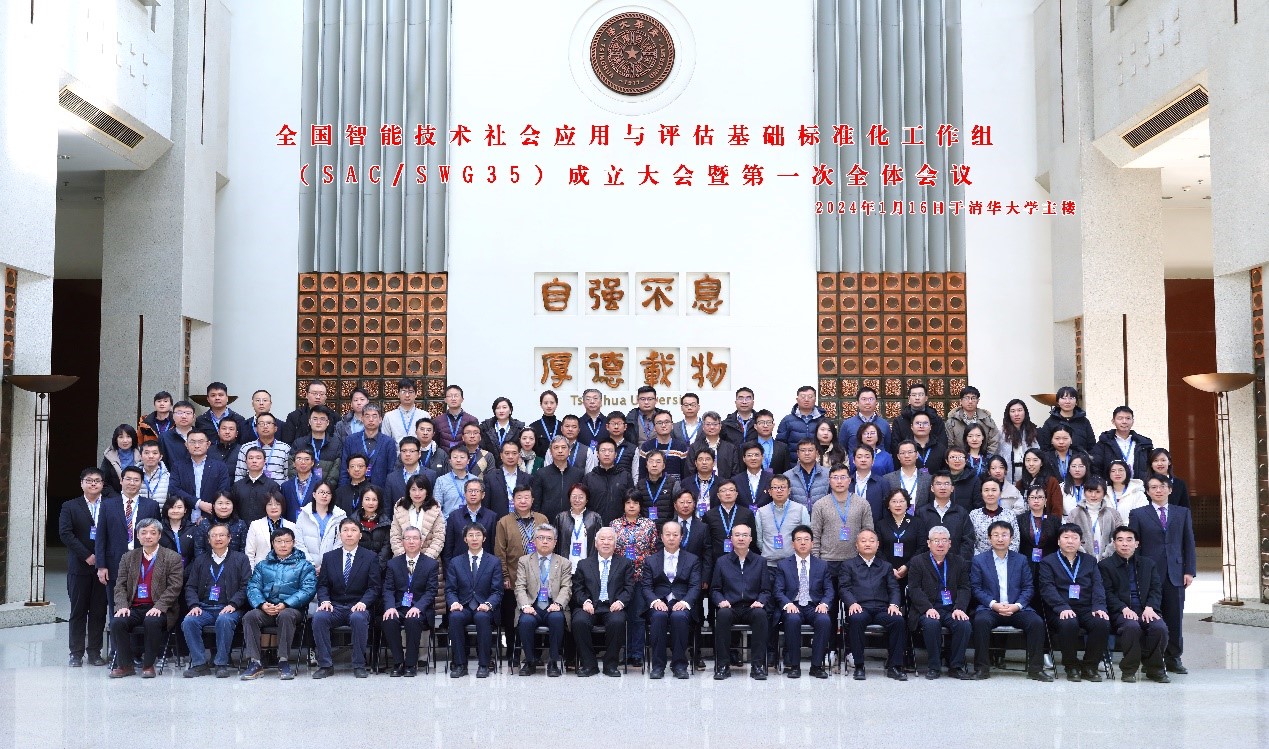| Founding ceremony and first plenary meeting of SAC/SWG convenes in Beijing |
| Date: 2024-01-22 Source:CNIS |
SAC/SWG 35, Social application and evaluation of intelligent technology, convened its founding ceremony and first plenary meeting at Tsinghua University in Beijing on January 16. The founding ceremony was hosted by Luo Fangping, Vice Chair of the working group and President of CNIS. Experts attended and addressed the ceremony, including Guo Huanxin, First-class Inspector of Standards Technical Management Department, State Administration for Market Regulation (SAMR), Long Kai, Deputy Director-General of Informatization Development Bureau of Office of the Central Cyberspace Affairs Commission, Zeng Rong, Vice President of Tsinghua University, Wu Hequan, former Vice President of Chinese Academy of Engineering (CAE) and Chair of China Standardization Expert Committee, Gu Binglin, former President of Tsinghua University and Academician of Chinese Academy of Sciences, Zhang Xiaogang, President of Chinese Society of Metals and former President of ISO, and Gong Ke, former President of World Federation of Engineering Organizations and former President of Nankai University. Yu Qian, Director of Technical Body Management Division of Standards Technical Management Department, SAMR, read out the document to approve the establishment of the working group. On behalf of Tsinghua University, Zeng Rong expressed sincere thanks for the support of SAMR and the attendance of leaders, members and experts. Standardization plays an essential role in protecting the interests of vulnerable groups, leading the benign development of intelligent technologies, and regulating issues such as the abuse of technologies, digital divide, and social polarization, said Zeng. Tsinghua University will gather multidisciplinary research sources related to intelligent technologies to provide solid support for standardization work. It is vital to bolster the standardization work for intelligent social governance, focusing on top-level design, key subjects, application, and international cooperation, pointed out by Guo Huanxin, who suggested SAC/SWG 35 to strengthen the construction of system, mechanism, capability and style of work, to further leverage its strengths for exploration and breakthroughs. The establishment of SAC/SWG 35 is a new starting point of standardization research on intelligent social governance, said Long Kai. Under the new circumstances and faced with challenges, the development of standards system and key standards in this field should be accelerated, and exert exploit China's advantages of resources and market scale, to deeply participate in international standardization activities. Wu Hequan underlined that the working group should attach equal importance to management and technology. Since generative artificial intelligence (AI) has received increasing global concern, SAC/SWG 35 can prioritize the safety of large language models, paying attention to AI application in fields of healthcare, education, politics and law, finance, and cyberspace affairs. The work of SAC/SWG 35 should promote the multi-disciplinary integration and opening-up, said Zhang Xiaogang. The mission of the working group is not only to solve the standardization issues in the process of modernizing governance system, but also to carry out more forward-looking fundamental research and participate in international standardization work. The working scope of SAC/SWG 35 covers the development and revision of standards for social application of intelligent technologies in fields such as foundation, general rules, testing methods, optimization methods and effect evaluation. The secretariat is jointly held by Tsinghua University and CNIS, managed and directed by the Standardization Administration of China. |
|
Attachments:
|
|
